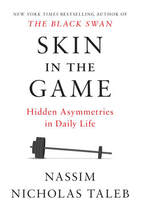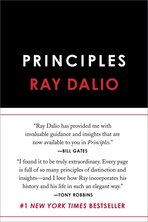|
My friend, fellow entrepreneur, and software engineer Jimi Smoot interviewed me on his Prior Transformation Podcast about "How Investors Think about Risk." I love podcasts in general, and it was the first time someone asked to interview me. It was fun having a casual conversation with my friend, and maybe some tidbits came out of it that could be useful for others.
Check out Jimi's post about the episode or listen to it below.
0 Comments

I'm a huge fan of Nassim Nicholas Taleb's work and thinking.
My favorite (most mind-altering) book from a few years ago was Antifragile. I also enjoyed his book of aphorisms, The Bed of Procrustes. Where Antifragile leaves off, there begins Skin in the Game: Hidden Asymmetries in Daily Life by Nassim Nicholas Taleb. I found that this last book builds on and combines a lot of the lessons in Fooled by Randomness, Black Swan, and Antifragile. It was really good. I also felt in many ways personally humbled and called out because I have, in the past and certainly in some ways in the present, fallen into the traps of scientism, IYI-ness, brain porn, etc. -- all the ways that our thinking can go wrong when not driven by skin in the game and survival-focused rationality. The concept of ergodicity was the toughest to grasp, and I felt like it could have been explained more clearly and in more depth with more examples, but after doing some careful re-reading, I think I got the essence of it. It presents a very useful lesson for thinking about real-world decisions and which class of probabilities the risks fall in: ergodic (not subject to absorbing barriers of ruin) or non-ergodic (subject to scenarios of total ruin, where traditional cost-benefit analysis and simple [academic] "probabilistic reasoning" doesn't make sense). It's so easy to forget this and keep going along doing the same type of pseudo-rational thinking that was drilled in us in college in "decision theory" classes. I like the counterbalance in his writing between intense technical rigor (see the technical appendix filled with formulas and proofs) and street smart "tawk" (calling on the wisdom of grandmothers and the ancients to point out what obviously makes sense in some situations rather than what "scientism" can delude us into believing [GMOs, etc.]). I wasn't a big fan of all the political name bashing and calling out of Monsanto shills, Hillary Monsanto Malmaison, and other such things, but I do get that this is part of the system of virtue where he cares a lot about calling out frauds by their true name and not caring what others think. There were a lot of valuable and practical lessons in the book, and some of my main takeaways are here:
I keep wondering how I can keep these fresh in my mind going forward and keep applying these to make tangible changes in my life (especially via negativa-wise) and become less of an IYI over time. Other (somewhat unresolved) questions this book has prompted me to think about:
My full notes on the book span 35 pages, but a collection of the points that were most relevant for me is below.  I finally finished making my way through Principles: Life and Work by Ray Dalio. I had heard so many good things about the book and had really enjoyed listening to some of the podcasts and speeches the author has given. The book was very well organized and presents a very interesting approach for running an organization. While I did learn a lot and have a lot of new things to think about now, I didn't think the book was as life-changing or revolutionary as some of the hype makes it out to be. The organization, Bridgewater, does sound unique, and I'd love to experience firsthand how believability-weighted decision making happens in real-time using all the tools he described. I want to feel what the idea-meritocratic culture is like and if it is in fact so different from other places and how embodied all these principles really are. My first biggest takeaway overall from the book is the idea that one should consider what principles one is operating under in general and write them down. I had done some of the former but not the latter, and after reading this book, I started my own list of written principles. My second biggest takeaway is how to maintain a balance between open-mindedness and assertiveness while arguing about a decision. Other cool things I took away were the concepts of believability (formalizing and quantifying how trustworthy someone is), which psychological/personality tests they believe in, and the collection of tools they use to make their principles actionable on a daily basis. As I was reading this book, I did catch myself wondering whether so much thinking of one's organization as a machine and doing everything idea-meritocratically and believability-weighted hampers any of the human elements of working on a company together. It felt like this approach could err dangerously close to thinking of one's team members as robots or automatons, just action figures with baseball cards and stats on where you can trust/believe them, and a machine to make them do what you need -- as opposed to three-dimensional, creative, wistful, soulful, erratic, emotional, complex people that are working together, with foibles and all, to try to achieve something. I don't know if the two views are diametrically opposed, but this book's approach felt to me to be a lot more mechanical and rigid (principled, obviously) in its treatment of people, and I wonder what any drawbacks (or unintended second order consequences) of that might be. The author explicitly wrote about the value of relationships, so I know this element is important for him, and I know he believes that radical transparency, honesty, and tough love is in the end the best for relationships. I just wonder how well it really treats people and makes them feel in practice. My full notes are below. |
Archives
June 2024
Categories
All
Subscribe |
 RSS Feed
RSS Feed
